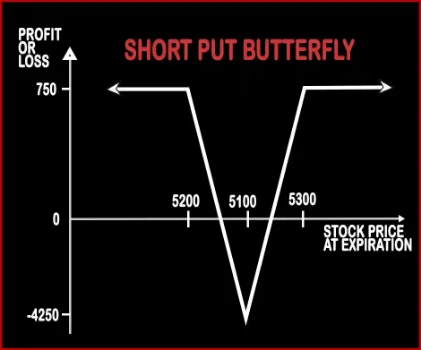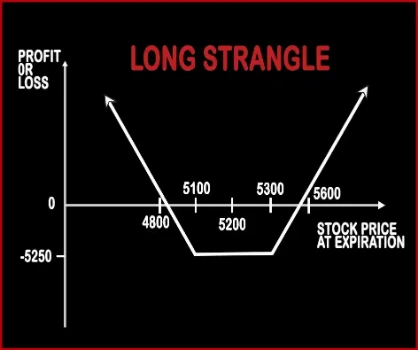Compare Strategies
| SHORT PUT BUTTERFLY | LONG STRANGLE | |
|---|---|---|

|

|
|
| About Strategy |
Short Put Butterfly Option StrategyIn Short Put Butterfly strategy, a trader is neutral in nature and expects the market to remain range bound in the near future. A trader will buy 2 ATM Put Options; sell 1 ITM & 1 OTM Put Options. Here risk and returns both are limited. Risk:< |
Long Strangle Option StrategyA Strangle is similar to Straddle. In Strangle, a trader will purchase one OTM Call Option and one OTM Put Option, of the same expiry date and the same underlying asset. This strategy will reduce the entry cost for trader and it is also cheaper than straddle. A trader will make profits, if the market moves sharply in either direction and gives extra-ordinary returns in the .. |
SHORT PUT BUTTERFLY Vs LONG STRANGLE - Details
| SHORT PUT BUTTERFLY | LONG STRANGLE | |
|---|---|---|
| Market View | Neutral | Neutral |
| Type (CE/PE) | PE (Put Option) | CE (Call Option) + PE (Put Option) |
| Number Of Positions | 4 | 2 |
| Strategy Level | Advance | Beginners |
| Reward Profile | Limited | Unlimited |
| Risk Profile | Limited | Limited |
| Breakeven Point | Upper Breakeven Point = Strike Price of Highest Strike Short Put - Net Premium Received, Lower Breakeven Point = Strike Price of Lowest Strike Short Put + Net Premium Received | Lower Breakeven Point = Strike Price of Put - Net Premium, Upper Breakeven Point = Strike Price of Call + Net Premium |
SHORT PUT BUTTERFLY Vs LONG STRANGLE - When & How to use ?
| SHORT PUT BUTTERFLY | LONG STRANGLE | |
|---|---|---|
| Market View | Neutral | Neutral |
| When to use? | In Short Put Butterfly strategy, a trader is neutral in nature and expects the market to remain range bound in the near future. | This strategy is used in special scenarios where you foresee a lot of volatility in the market due to election results, budget, policy change, annual result announcements etc. |
| Action | Sell 1 ITM Put, Buy 2 ATM Put, Sell 1 OTM Put | Buy OTM Call Option, Buy OTM Put Option |
| Breakeven Point | Upper Breakeven Point = Strike Price of Highest Strike Short Put - Net Premium Received, Lower Breakeven Point = Strike Price of Lowest Strike Short Put + Net Premium Received | Lower Breakeven Point = Strike Price of Put - Net Premium, Upper Breakeven Point = Strike Price of Call + Net Premium |
SHORT PUT BUTTERFLY Vs LONG STRANGLE - Risk & Reward
| SHORT PUT BUTTERFLY | LONG STRANGLE | |
|---|---|---|
| Maximum Profit Scenario | Net Premium Received - Commissions Paid | Profit = Price of Underlying - Strike Price of Long Call - Net Premium Paid |
| Maximum Loss Scenario | Strike Price of Higher Strike Short Put - Strike Price of Long Put - Net Premium Received + Commissions Paid | Max Loss = Net Premium Paid |
| Risk | Limited | Limited |
| Reward | Limited | Unlimited |
SHORT PUT BUTTERFLY Vs LONG STRANGLE - Strategy Pros & Cons
| SHORT PUT BUTTERFLY | LONG STRANGLE | |
|---|---|---|
| Similar Strategies | Short Condor, Reverse Iron Condor | Long Straddle, Short Strangle |
| Disadvantage | • High risk strategy and may cause huge losses if the price of the underlying stocks falls steeply. • Higher profit is only possible when shares get close to expiration. | • Require significant price movement to book profit. • Traders can lose more money if the underlying asset stayed stagnant. |
| Advantages | • Benefits from time decay. • Traders can earn more in a rising or range bound scenario. • Benefits from a surge in volatility. | • Able to book profit, no matter if the underlying asset goes in either direction. • Limited loss to the debit paid. • If the underlying asset continues to move in one direction then you can book Unlimited profit . |